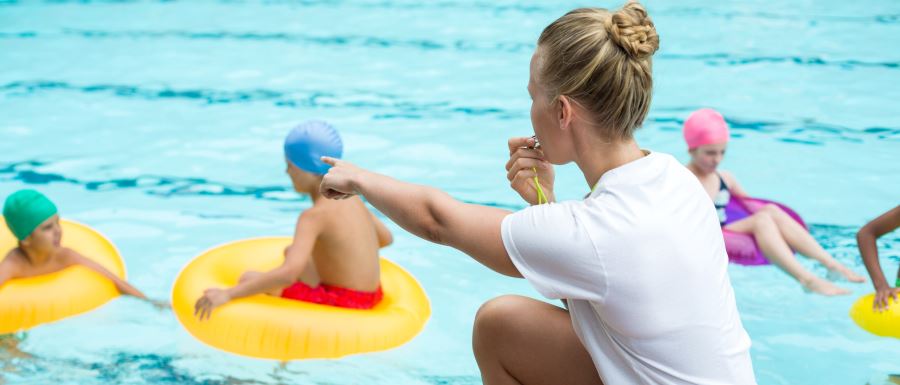
Pool Supervision: what do these words really mean?
To most people, “pool supervision” implies that a parent or adult is sitting on the side of the pool watching their children swim. In reality, however, parents or adults are usually there physically and not mentally when supervising their children in the water, only lifting their head for the occasional glance to watch their child in the water.
To a lifeguard, “pool supervision” means constant surveillance of swimmers in the water, looking for signs of a person in distress or abnormal behaviour. To be fully effective, you need to understand the hazards and risks associated with water.
Pool Super Vision™ (PSV) is the brainchild of Gary Johnson from Tamworth in NSW. It is the due-diligence approach to the prevention of injury and death from drowning events at public swimming pools.
PSV began as an image-based training program that now teaches all WA pool lifeguards to supervise their patrons using a technique built on the Australian Standard for Risk Management- AS/NZS ISO 31000:2009.
Only by understanding the hazards and risks associated with watching patrons in the water can a person effectively supervise a water body and the swimmers within it.
So, what are the hazards around a pool or water body? Some might say “drowning”, but this is the outcome or consequence of the hazard. Is it “water”? Close, but in PSV the term used is Dead Water: an area of water that cannot be effectively supervised.
PSV has identified various elements that form hazards and risks associated to Dead Water. Here are just a few to think about:
Glare shining on the water surface such as sunlight or artificial lighting produces light reflection off the water. When you look at the water body that has glare, it is in most cases impossible to see what is underneath the glare and increases the possibility of not seeing a person only centimetres under the water surface. The only way to prevent this is to move your supervising position to allow the glare to also move or disappear from the water surface.
Shade: Whilst too much light can prevent you seeing under the water, a lack of light can also inhibit supervision due to shaded areas over the water forming black or dark spots in the water and prohibiting the illumination of patrons on or under the water surface.
Line of sight refers to the ability to maintain an unobstructed view of the patron/bathers in their area. In the context of PSV, it relates to the positioning of the person supervising the pool. If you can’t see past an object, then move to another position where you can see.
Distraction is often a common cause of incidents around pools, which could be parents on their mobile phones, chatting to a friend, or having a coffee at the poolside café. It also includes patrons talking to lifeguards or problem patrons distracting the lifeguard. Whilst distraction can be physical, it can also be mental, meaning that fatigue, stress, or excessive internal thoughts can distract from a person’s ability for effective supervision. Maintaining focus mentally is often the biggest challenge that people supervising a water body face when doing it for long periods of time.
Disturbance of water can be attributed to a wide range of activities that create waves that disturb the otherwise smooth nature of water. Swimming, splashing, water features, wind and rain are just a few items that can turn crystal-clear water bodies into a sheet of frosted textured glass that obscures the ability to see or recognise swimmers under the water.
It is important that people supervising patrons in water are able to understand the dynamics of this type of disturbance and adjust their supervision strategies to suit the environment.
The best form of defence towards drowning is understanding the hazards and risks to allow better constant supervision and the ability to always watch around water.
If you're interested in becoming a pool lifeguard, learn more at the link below:
